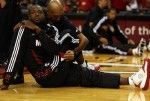Injuries Plague Shortened NBA Season

Most sports fans would agree that the regularly scheduled 82-game NBA season goes on for too long. An eight-month season that starts in November and continues through June tries the patience of all but the most devoted fans of professional basketball.
However, the decision by NBA Commissioner David Stern to squeeze 66 regular season games into four months appears to have drawbacks as well. Player injuries are mounting from the stress of the compacted schedule and the overall level of play is lower than it has been in recent years. Early league statistics illustrate this point best – across the league, scoring is close to five points per game lower than last year. Similarly, field goal percentages are down and turnovers are up. With the truncated 2011-12 season almost a quarter of the way through, the effects of Stern’s decision are not only taking their toll on players, but also on the game itself.
Most teams are dealing with a higher number of injuries than normal because of the condensed schedule. Teams are averaging about four games a week, up from three last year, and every team is required to play nine games in twelve days, including a set of back-to-back-to-back games (three games in three days). Players have less rest and recovery time between games and the compounded wear and tear on their bodies makes them even more prone to injury. Miami Heat superstar Dwyane Wade has been hampered by a bad ankle and has had to sit out a few games. Kobe Bryant, who finally declared himself healthy at the beginning of training camp after an experimental knee surgery in Germany, is also injured, playing with a torn tendon in his wrist. However, it’s Boston’s aging “Big Three” that seem to have been hit with the injury bug hardest. They have gotten off to a terrible start at 7-9, with Rajon Rondo playing through some nagging injuries and Paul Pierce battling a heel issue. The list of injuries goes on and, in this fan’s opinion, it has diminished the quality of professional play.
Following Commissioner Stern’s decision to maximize the number of games played within the shortened season, the owners did not allow for a full training camp, instead opting for a shortened two-week preseason. Limiting preseason practice and workouts meant that teams not only had less time to integrate new players into their system, but also spent less time on overall physical conditioning and building team “chemistry.” Team chemistry takes time to develop – as was evident with the Miami Heat last season – and players need time together to practice and reflect in order to define their on-court roles. The lack of a proper training camp, coupled with less recovery time between games and the higher number of travel days, has hampered both individual and team play. New York’s storied franchise, the Knicks, are a perfect example of this. Entering the season with what is believed to be one of, if not the best, frontcourts in the game (Carmelo Anthony, Tyson Chandler and Amare Stoudemire) the Knicks are struggling. As of January 23, New York’s own “Big Three” have not been able to gel with an abysmal record of 7-10.
By keeping 66 out of 82 regular season games on the compacted schedule, Commissioner Stein was clearly attempting to help the owners minimize revenue lost as a result of the lockout. He also claimed that more games would benefit the fans. However, one cannot ignore the fact that the additional injuries and diminished play has negatively impacted the game and, as a result, the level of enjoyment.
Although this fan was and still is excited that the NBA is back after a grueling and tortuous lockout, it is impossible to ignore the negative impact the condensed and strenuous schedule has had on the league. Ideally, the league would have been much better off if they made the season, say, 50 games and included a full training camp. That way, the playoffs would still finish in June, but the players would have the proper rest and practice time that they need to compete at the high level that we, the fans, have come to expect. For how much it costs to attend the games, the fans certainly deserve it.
Contact Matt Heineman at [email protected].






